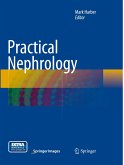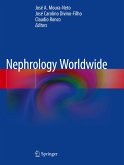Management of Kidney Diseases
Herausgegeben:Banerjee, Debasish; Jha, Vivekanand; Annear, Nicholas M.P.
Management of Kidney Diseases
Herausgegeben:Banerjee, Debasish; Jha, Vivekanand; Annear, Nicholas M.P.
- Broschiertes Buch
- Merkliste
- Auf die Merkliste
- Bewerten Bewerten
- Teilen
- Produkt teilen
- Produkterinnerung
- Produkterinnerung
This book provides an evidence based guide to the management of common kidney conditions. Concise and highly structured chapters outline a diagnosis and treatment framework for kidney diseases encountered within daily practice. Particular attention is given to the management of chronic kidney disease, genetic kidney diseases, cardiovascular complications, haemodialysis, kidney cancer, peritoneal dialysis, and kidney transplantation.
Management of Kidney Disease aims to improve outcomes for patients with kidney diseases and is relevant to trainee and practising nephrologists, as well as…mehr
Andere Kunden interessierten sich auch für
![Management of Kidney Diseases Management of Kidney Diseases]() Management of Kidney Diseases183,93 €
Management of Kidney Diseases183,93 €![Technological Advances in Care of Patients with Kidney Diseases Technological Advances in Care of Patients with Kidney Diseases]() Technological Advances in Care of Patients with Kidney Diseases79,99 €
Technological Advances in Care of Patients with Kidney Diseases79,99 €![Technological Advances in Care of Patients with Kidney Diseases Technological Advances in Care of Patients with Kidney Diseases]() Technological Advances in Care of Patients with Kidney Diseases79,99 €
Technological Advances in Care of Patients with Kidney Diseases79,99 €![Complications in Dialysis Complications in Dialysis]() Complications in Dialysis85,99 €
Complications in Dialysis85,99 €![Complications in Dialysis Complications in Dialysis]() Complications in Dialysis118,99 €
Complications in Dialysis118,99 €![Practical Nephrology Practical Nephrology]() Practical Nephrology76,99 €
Practical Nephrology76,99 €![Nephrology Worldwide Nephrology Worldwide]() Nephrology Worldwide117,69 €
Nephrology Worldwide117,69 €-
-
-
This book provides an evidence based guide to the management of common kidney conditions. Concise and highly structured chapters outline a diagnosis and treatment framework for kidney diseases encountered within daily practice. Particular attention is given to the management of chronic kidney disease, genetic kidney diseases, cardiovascular complications, haemodialysis, kidney cancer, peritoneal dialysis, and kidney transplantation.
Management of Kidney Disease aims to improve outcomes for patients with kidney diseases and is relevant to trainee and practising nephrologists, as well as healthcare professional treating kidney diseases.
Additional questions and answers via app: Download the Springer Nature Flashcards app free of charge and use exclusive additional material to test your knowledge.
Hinweis: Dieser Artikel kann nur an eine deutsche Lieferadresse ausgeliefert werden.
Management of Kidney Disease aims to improve outcomes for patients with kidney diseases and is relevant to trainee and practising nephrologists, as well as healthcare professional treating kidney diseases.
Additional questions and answers via app: Download the Springer Nature Flashcards app free of charge and use exclusive additional material to test your knowledge.
Hinweis: Dieser Artikel kann nur an eine deutsche Lieferadresse ausgeliefert werden.
Produktdetails
- Produktdetails
- Verlag: Springer / Springer International Publishing / Springer, Berlin
- Artikelnr. des Verlages: 978-3-031-09133-9
- 2023
- Seitenzahl: 596
- Erscheinungstermin: 1. April 2024
- Englisch
- Abmessung: 254mm x 178mm x 24mm
- Gewicht: 1239g
- ISBN-13: 9783031091339
- ISBN-10: 3031091337
- Artikelnr.: 70275150
- Herstellerkennzeichnung Die Herstellerinformationen sind derzeit nicht verfügbar.
- Verlag: Springer / Springer International Publishing / Springer, Berlin
- Artikelnr. des Verlages: 978-3-031-09133-9
- 2023
- Seitenzahl: 596
- Erscheinungstermin: 1. April 2024
- Englisch
- Abmessung: 254mm x 178mm x 24mm
- Gewicht: 1239g
- ISBN-13: 9783031091339
- ISBN-10: 3031091337
- Artikelnr.: 70275150
- Herstellerkennzeichnung Die Herstellerinformationen sind derzeit nicht verfügbar.
Professor Debasish Banerjee is a clinical nephrologist managing CKD, dialysis and kidney transplant patients with special expertise in cardiovascular complications, hypertension, heart failure and diabetes. As a member of the European Society of Cardiology (ESC) Working Group on Cardiovascular Pharmacotherapy, and following his establishment of a unique "kidney failure - heart failure" clinic at St George's, he has contributed towards international strategies for managing CKD patients with cardiovascular disease and heart failure. As part of the Association of British Clinical Diabetologists (ABCD) Renal Association Clinical Study Group, he has contributed towards the national guidelines for the management of CKD patients with the added complication of diabetes. As a keen researcher in cardiovascular complications he has received research grants from the British Heart Foundation, Kidney Research UK, the Wellcome Trust, Guy's and St Thomas' Charity and St Georges' Hospital Charity. As a member of Kidney Research UK's cardiorenal study group and as a reviewer for the MRC, NIHR, and Kidney Research UK, he has been involved in reviewing research in the cardiovascular complications of CKD in the UK. He serves the International Society of Nephrology (ISN) action of clinical trials as the co-chair for patient engagement group, to improve patient involvement in international nephrology trials. He has won many teaching awards including the 'Best Undergraduates Medicine Teacher Award' at St George's, an 'Excellence in Teaching Award' at St George's, a 'Distinguished Teacher Award' from University College London, the 'Inpatient Student Teaching award' at the University of Miami and 'Overall Contribution to Education Award' from St George's Hospital. He successfully supervised several MD and BSc research students. Professor Banerjee has fostered several international collaborations as the lead for the ISN India-UK Sister Centre program and as an ISN educational ambassador, collaborating with renal units in India, Ghana and Jamaica. He also serves as chair of Training and Education Committee and member of International Committee of the UK Kidney Association. Professor Vivekanand Jha is the Executive Director, The George Institute for Global Health, India, and Chair of Global Kidney Health, Faculty of Medicine, Imperial College London. He is also the President of the International Society of Nephrology. Prior to joining The George Institute, he was Professor of Nephrology and Head, Department of Translational Regenerative Medicine and Officer-In-Charge, Medical Education and Research Cell at the Postgraduate Institute of Medical Education and Research in Chandigarh, India. Vivek serves on the international advisory boards of several organisations including membership of the WHO Expert Advisory Panel on Human Cell, Tissue and Organ Transplantation, and the executive committee of the International Society of Nephrology. He is a councillorof the International Society of Nephrology, a member of the education committees for the International Transplantation Society and International Society of Peritoneal Dialysis. He is a physician with a specialisation in the area of kidney diseases and he focuses on emerging public health threats globally and in India. He is particularly interested in using multi-disciplinary approaches and innovation to address the major challenge posed to humanity by non-communicable diseases. Dr Nicholas Annear qualified from St George's, University in 2003, and was one of the first Academic Clinical Fellows appointed in the country in Nephrology & General Medicine at Imperial College in 2006. He was awarded a Wellcome Trust Research Training Fellowship in 2010, and undertook research into the Cellular response to hypoxia at UCL. He has presented his work at various national and international meetings, and was awarded his PhD in November 2013. He was subsequently appointed as Clinical Lecturer inNephrology at Kings College London. He has adapted his considerable teaching and research skills toward developing the Acute Kidney Injury service at St George's and setting up a new clinic for TSC patients to help treat those with renal complications of this condition. Dr Annear has also adapted his teaching skills into his role as an Honorary Senior Lecturer in the Institute for Medical and Biomedical Teaching at SGUL, where he both Leads the Undergraduate placements for Acute Medicine, and has been appointed Lead for Clinical Medical Placements, Local and International.
1. The Approach to the patient with kidney disease.- 2. Investigating Kidney Disease.- 3. Proteinuria and Haematuria.- 4. Acute Kidney Injury.- 5. Chronic kidney disease(CKD) - evaluation of the cause and prevention of progression.- 6. CKD: Management and Prognosis.- 7. Management of anaemia in chronic kidney disease.- 8. Blood pressure in CKD.- 9. Mineral and Bone Disorder in CKD.- 10. Diabetes and CKD.- 11. Cardiovascular Complications of CKD.- 12. Glomerular disease: Primary.- 13. Glomerulonephritis: Secondary and Renal Vasculitis.- 14. Infections and the Kidney.- 15. Genetic Kidney Diseases.- 16. Kidney Cancer.- 17. Hemodialysis in Clinical Practice.- 18. Complications of Haemodialysis.- 19. Peritoneal dialysis.- 20. Complications of Peritoneal Dialysis: Prevention and Management.- 21. Kidney Transplantation: The pre-transplantation recipient and donor work-up.- 22. Management of patient after kidney transplantation.- 23. Complications of Kidney Transplantation.- 24. Approach toObstetric Nephrology.- 25. Transitional Care of Adolescents and Young Adult Patients with Kidney Disease.- 26. Conservative Care for Patients with Chronic Kidney Disease.- 27. Acid/Base and Electrolyte.- 28. The role of Renal Registries.
1. The Approach to the patient with kidney disease.- 2. Investigating Kidney Disease.- 3. Proteinuria and Haematuria.- 4. Acute Kidney Injury.- 5. Chronic kidney disease(CKD) - evaluation of the cause and prevention of progression.- 6. CKD: Management and Prognosis.- 7. Management of anaemia in chronic kidney disease.- 8. Blood pressure in CKD.- 9. Mineral and Bone Disorder in CKD.- 10. Diabetes and CKD.- 11. Cardiovascular Complications of CKD.- 12. Glomerular disease: Primary.- 13. Glomerulonephritis: Secondary and Renal Vasculitis.- 14. Infections and the Kidney.- 15. Genetic Kidney Diseases.- 16. Kidney Cancer.- 17. Hemodialysis in Clinical Practice.- 18. Complications of Haemodialysis.- 19. Peritoneal dialysis.- 20. Complications of Peritoneal Dialysis: Prevention and Management.- 21. Kidney Transplantation: The pre-transplantation recipient and donor work-up.- 22. Management of patient after kidney transplantation.- 23. Complications of Kidney Transplantation.- 24. Approach toObstetric Nephrology.- 25. Transitional Care of Adolescents and Young Adult Patients with Kidney Disease.- 26. Conservative Care for Patients with Chronic Kidney Disease.- 27. Acid/Base and Electrolyte.- 28. The role of Renal Registries.








